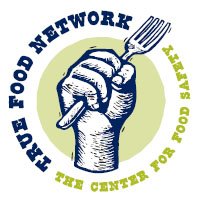 Monsanto pressures FDA to restrict rBGH-free labeling
Monsanto pressures FDA to restrict rBGH-free labelingSeveral large dairy producers and food companies have made news recently by getting rid of recombinant bovine growth hormone, also known as rBGH or rBST, from their milk supply. This is great news for consumers, since this genetically engineered growth hormone is known to cause harm to cows and may pose health risks to humans.
In yet another attack on consumers' right to know, Monsanto, the company that makes rBGH under the trade name Posilac, has asked the Food and Drug Administration to restrict the use of labels identifying “rBGH-free” or “rBST-free” dairy products. Monsanto claims such labels are "misleading" to consumers, and infer that dairy products without such a label are inferior. FDA approved the use of voluntary labels more than 12 years ago at the request of dairy companies seeking to respond to customer concerns over the use of the genetically engineered hormone. Since FDA refused to require mandatory labeling of dairy products from cows treated with rBGH, voluntary labeling by non-adopters is the only label consumers can count on to make informed decisions. If Monsanto succeeds in convincing FDA to restrict rBGH-free labeling, consumers will lose valuable information about how their food is produced. Protect your right to know - Send an email to the FDA today
Florida bans non-native and genetically altered fish in open water aquaculture
The Southern Shrimp Alliance and the Center for Food Safety praised the Florida Department of Agriculture and Consumer Services (FL DACS) for new rules governing farm-raising of fish in Florida's ocean waters. FL DACS created the task force in April 2005 in response to calls for stringent guidelines governing the growing open water aquaculture industry. Their draft standards, completed in April 2006, underwent rigorous review by Florida agencies for eight months. The resulting "Best Management Practices Manual" was released to the public in December 2006 for comments, and was officially finalized in May.
The Center for Food Safety strongly urged FL DACS to ban use of non-native and altered fish in open ocean aquaculture during development of the Best Practices, as Florida is already experiencing the effects from fish farm escapes. Spotted tilapia, Orinoco sailfin catfish, and the oscar are just a few of the non-native fish that have escaped from fish farms and established themselves in Florida waters. Federal regulations governing aquaculture in the Gulf of Mexico are currently in the process of being drafted. The Gulf of Mexico Fishery Management Council, an advisory body, is working on an open water aquaculture plan that would apply outside Florida waters.
Genetically Engineered Pharmaceutical Rice Is Not the Solution to Diarrhea
Drugs in Rice Not Approved by FDA, Will Likely Contaminate Foods
Genetically engineered, pharmaceutical rice is not a safe or cost-effective solution for infants suffering from diarrhea, concludes an exhaustive report by the Center for Food Safety, as the U.S. Dept. of Agriculture (USDA) considered whether to allow planting of up to 3,200 acres of the rice in Junction City, Kansas this spring. The report discusses potential adverse health impacts of the rice-grown drugs, which have not been approved by the FDA.
Developed by California-based Ventria Bioscience, the rice is engineered with modified human genes to serve as a “biofactory” for production of synthetic human milk proteins that have antimicrobial and other drug-like properties. Ventria has proposed using the rice-extracted protein drugs to treat infants with diarrhea, and as additives in infant formulas, yogurt, granola bars and sports drinks, among other uses.
The report details Ventria’s failed attempts to gain FDA approval of its rice-grown drugs dating back to November 2003. Despite more than 20,000 comments objecting, USDA approved the planting last month.


No comments:
Post a Comment